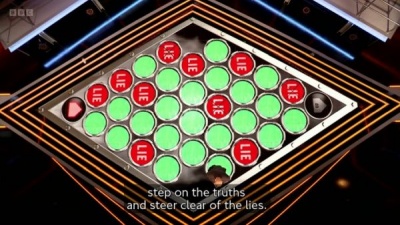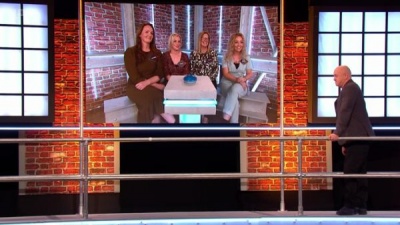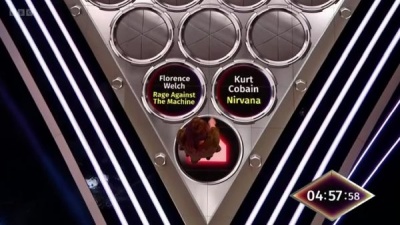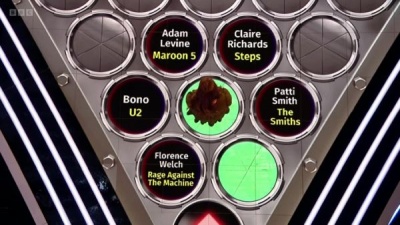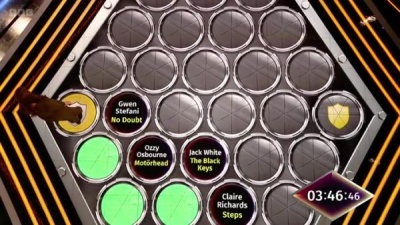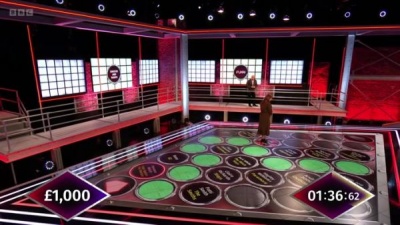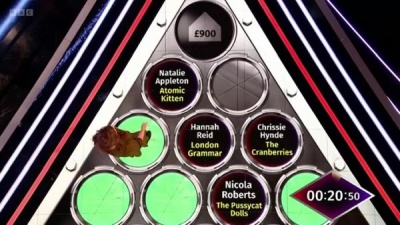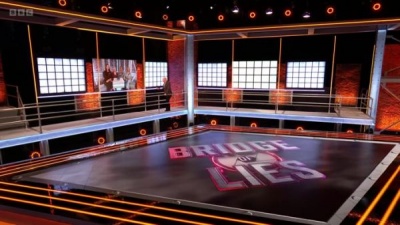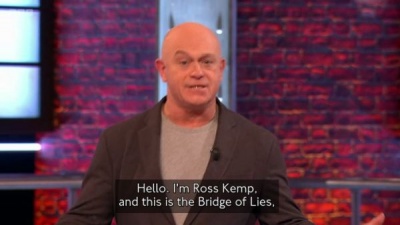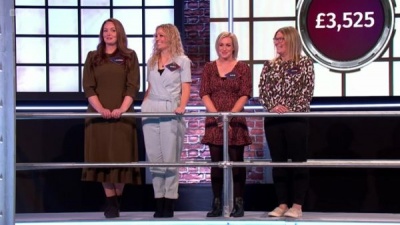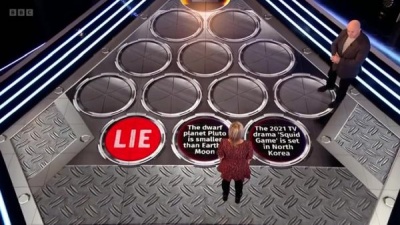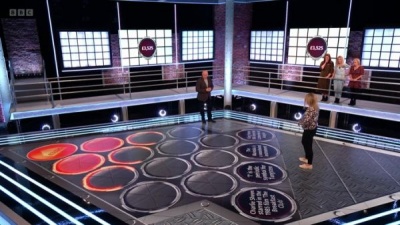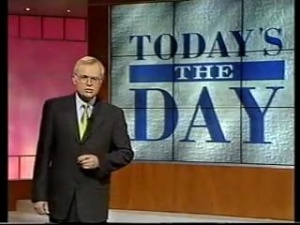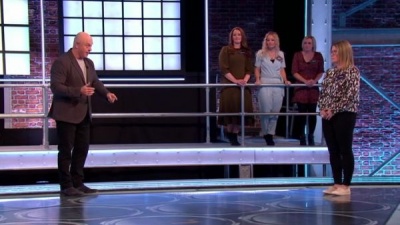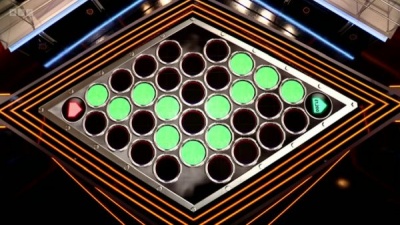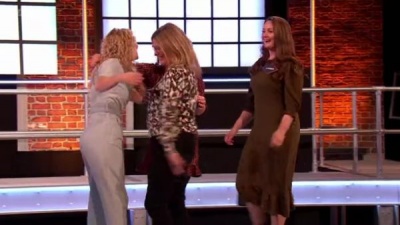Weaver's Week 2022-04-24
Last week | Weaver's Week Index | Next week
"There's never plenty of time!"
Contents |
Bridge of Lies
STV Studios for BBC1, 14 March – 15 April
Every so often, a show crosses our radar, and we think, "This is just brilliant." Bridge of Lies is one such standout show.
The idea is simple. Our contestants are faced with a "bridge", a way to cross from the start to the finish. The bridge is made up of many individual circles, tessellated in a hexagonal pattern. The task is to step on the truths, and steer clear of the lies. Ross Kemp, our host, explains everything in the first 30 seconds of the show.
Every episode follows one team from the Waiting Room to the final round. The game is played by a team of four, they'll each have their five minutes of solo fame.
In the main game, the bridge will reveal a broad hint to the category. These are broad hints – "bands", "words", "inventions", that kind of non-specific thing. One person emerges from the group, whether as a volunteer, or as the person with the biggest knowledge of that topic, or just because nobody else will step up. That player will take on the bridge in the opening round, and comes forward to meet Ross on the main floor.
Ross explains the challenge ahead: get from the start to the finish by forming a path of truths. There is always a true path, but it's up to the young walker to find it. Hiding amongst the answers are ten lies, answers that don't fit the category. For instance, if the category is "Singers and bands", the answer "Kurt Cobain – Nirvana" is true, because Kurt was the singer with Nirvana. "Florence Welch – Rage Against the Machine" is false, because Florence never sung with the Christmas number one hitmakers.
Each correct answer earns £100 for the pot, and opens up the answers on the adjacent circles.
It can quickly be seen that the more obvious answers are concentrated near the start – whether truths or lies. This helps to ensure the round doesn't come to a halt too quickly, it needs to last most of the allocated five minutes otherwise there will have to be some fairly blatant padding. As the contestant gets further along the bridge, the answers become more obscure.
Because the game is played corner to corner, it will take at least 10 answers to make the journey – probably more. There are 36 spaces on the bridge: a start, a finish, 10 lies, 22 truths, and two safety zones. When a contestant reaches a safety zone, they get to stop the clock for a brief moment, and the bridge will reveal one of the lies uncovered on their journey.
From time to time, a player may step on a lie. This is not advisable, as it halves the money in their pot – the £1000 becomes £500, and it does not open up any new possible answers. Remember, the objective is to form an unbroken path of true answers.
Players can retrace their steps along the path of truth, and branch off in another direction. They can do this if they're unsure of the answers at the frontier. They can do this to leave a safety zone, take a few moments longer to think about the final decision and hope the bridge makes it for them. Or they can do this if they're exceptionally cocky and want to run up the money.
This is a timed event, players have exactly five minutes to go from the start to the finish. The round is lost if the player runs out of time, or if they step onto three lies.
However, there is a genius move at work. The players in the waiting room – those who are yet to play – are watching progress on a screen. They have a "panic button", and can press it at any moment. When they press the button, it ends the round at once – the player advances to the final with whatever money they had in their kitty at that moment. Subsequent play is ignored, whether that was a win or a loss.
Winning players go to the "vault", where there is no panic button. The show makes it look like they don't know the result of the other players' challenges until someone steps through the door. The "panic button" can only be played once, and only by someone in the waiting room – so in the first three rounds.
Each player has their one solo round. It'll fill the first 35 minutes (or so) of the show.
The set has bare brick walls, some wood panelling, and large windows. We suspect that all of this is decoration. The set also features a raised walkway, waist high to someone on the main game floor. Ross Kemp is confined to this walkway throughout the main game. It's a simple and elegant way to ensure a healthy distance. An overhead camera ensures we can always get a clear and legible view of the gameboard, and the options around where the player is.
The set doesn't look a million dollars, but the stark brickwork and exposed girders give it a gritty, down-to-earth feel. The bridge – a high-tech video display floor – probably does cost a million dollars, and there are small insets in the windows to give time and score. Bridge of Lies benefits from a cohesive look and feel, everything is in a circle (like the answers) or a diamond (like the bridge). There's an electronic soundtrack from the Jump studio.
Ross Kemp proves that he's a great actor by – not acting! Known to millions as Grunt Mitchell, the hard man from Eastenders, Ross is clearly on the side of the contestants. He enunciates each answer clearly and at good speed, and makes sure that contestants don't run out of time because of him.
Contestants are often under time pressure. Often, it's because they underestimate how long the crossing is going to be. You need at least 10 correct answers, probably nearer 15. You cannot afford to deliberate for too long, you cannot waste time explaining why Billie Jo Armstrong wasn't the lead singer of Blink-182. Find an answer you know; failing that, find an answer you think is right.
There is no method for contestants to mark the answers they believe to be wrong. Bridge of Lies might have issued the contestants with some reusable plastic markers – perhaps provided by the BBC canteen – to lay on the things they believe to be wrong. Instead, contestants have to use their memory to remember what they think is false.
Anyway, we've eventually reached the final round. At least one player needs to have made it across. We didn't get to see what happens if the bridge eats all of the players, but it's either Ross Kemp talking for six minutes about the Jubilee Line Extension, or they bring back one player for a nominal prize.
Before the round proper begins, the bridge makes an offer. You can play on as you are, for the money you've earned. You can sell one of your players, and the bridge will double the stakes. Or you can buy back a player, but it'll cost half the money in the pot. Play for £1500 and three people, or £3000 and two people, or £750 and all four?
The final round is, quite simply, Celwydd Noeth statements played in reverse – the objective is to spot the one barefaced truth in each set. Like on STV's The Lie and other language variants, the statements start quite easy and get harder.
The first row asks for the truth in "Botticelli was a Teenage Mutant Hero Turtle" and "Maximum speed limit signs are circular". We all know it's the latter.
By the final round, it's "Raspberries are in the rose family" and "Lily Allen won a BRIT award in 2021". Very few will know it's the first statement, the rest of us have only a few seconds to guess.
It is a timed event, and the time is shown in an unusual way. A "wave" of colour starts at the far end of the bridge, and the player needs to stand on a statement before it reaches the far edge of that row. The "wave" moves at a consistent speed, so the first rows have plenty of time available, the last row has next to no thinking time. The contestant is eliminated if they don't pick an answer, or if they stand on a lie.
And that's why it's so important to have lots of players. Each player allows an extra mistake in the final round – a full team is allowed to make three mistakes, the solo player has to get absolutely everything right. Are you more likely to succeed with an extra player; can you possibly succeed with a player less? The decision makes it much harder to win, or somewhat easier.
Yes, they do play out the final row even if there are two players for the two options. It's still possible to lose on time. Yes, eliminated players do get their cut if the team wins.
We've found Bridge of Lies to be compelling television, it holds our interest and we can't help but play along. Could it shuffle forward from 4.30?
It's Friday, it's 5.15...
What are we watching?
Let's cut to the chase: Bridge of Lies would work very well on BBC1 at 5.15.
A brief piece of history is in order. The 5pm quiz began in the 1980s with Blockbusters and Connections, something for teenagers to watch. Older viewers got the slot in the 1990s as an outpost of daytime television on BBC2. The cosy nostalgia of Martyn Lewis's Today's the Day, popular word game Catchword, antiques show Going, Going, Gone, quick-thinking quiz Pass the Buck (2).
The Weakest Link came along in 2000, and proved to be an instant success. It's an outlier in the world of 5pm quizzes, combative and overtly competitive and ill-tempered. The Weakest Link was not cosy at all. ITV tried various options – chat shows, nostalgia, cookery, quiz-and-deception hybrid The Great Pretender, televised trollfest Divided – before settling on The Chase.
Since the teatime quiz moved from BBC2 to BBC1 in early 2008, only two regular shows have had extended runs – The Weakest Link, and Pointless. !mpossible had a short series a few summers ago, but seems to have fallen out of favour and might well have asked its final question.
Channel 4 has consistently done something different at 5: Come Dine with Me and Four in a Bed both have extended runs, and there is room for other more experimental lifestyle formats. Quizzes are going to get buried in the 5pm hour, as Five Minutes to a Fortune found out some years ago. (We'll discuss Channel 4 as a whole next week.)
What are the most important factors for a show in the 5pm hour? It's got to fit around people's lives. Viewers drift in and out through the hour – there are chores to do, dinner to cook, children ask for help with homework, people at the front door. Expect the programme to be rewound or the viewer to skip through bits. If your show demands concentration from the start to the end, it'll never work at 5pm – Chase the Case could never have happened here.
Successful shows have a certain charm – call it "hygge", call it "gezellig". It's spending some enjoyable time with friends and acquaintances. Richard and Xander. Bradley and his brainboxes. Dave Lamb and those home cooks. We can't define the charm, but we know it when it's there – and we know it when it's absent. In the 6pm hour, Richard Osman's House of Games (3) has the togetherness factor, Eggheads has it, Lightning doesn't.
A great 5pm show will naturally build to a clear final. While returning contestants are fine, each episode needs to be a story in itself – shows that straddle from one episode to the next, like ITV's Divided, tend not to work. We don't need a win on every episode, but we do need to see that the game can be won.
Why does Bridge of Lies work well as a 5.15 show? Bridge of Lies is interesting from the start, and ramps up the tension as it goes along. Each round is very similar in structure, and very easy to pick up. "Step on the truths, avoid the lies." No two rounds are ever the same, thanks to the different ways people play it.
There's a clear and common opponent – we can always cheer for the contestant, and boo against the bridge. It's a show you can join part-way through, dip in and out of a game or a round, and still have it make sense. The money isn't won until the final moments, and tension is kept up to the final moments.
The only way we can know a team's going to win is if they get to the last rows with lots of people to spare. We can predict a win, and follow the team on a lap of honour. For this column, that's more fulfilling than some final Chases or Pointless jackpot rounds, where it's clear that they're going to lose and we're just going to have to bear it.
We are blessed with a surfeit of 5pm shows. ITV has a triple bill of them – Tipping Point and Lingo Zonder Ballen would all work perfectly well at 5pm, but The Chase got there first and isn't going to budge. Other shows we'd pick for the 5pm hour include Cash Trapped, First & Last, 500 Questions played for lower stakes, Wonderball, and Google That!.
In other news
A small change to Tipping Point, where only three contestants take part in the opening round. It balances the daytime show with its celebrity edition, and it means there aren't so many people making a wasted journey to Wimbledon or Hammersmith or Bristol or wherever it is the machine's landed this week.
Rumours over the Easter weekend that ITV2 had picked up Big Brother for next year. The show, which puts people in a house and films them around the clock, has run on Channel 4 and Channel 5, sliding down the EPG at the rate of one channel per decade. (We cannot wait to see what BBC4 make of the format in 2044.) After a week, nobody has confirmed this rumour, and we wonder if it's an editor who forgot that Easter only coincided with April Fool's Day in 2018.
No fools in Millstreet, where 70 refugees from Ukraine have a temporary home. The showjumping arena, and venue for the 1993 Eurovision Song Contest, has had carpet fitted, overhead heating installed, and temporary partitions put in. Government minister Roderic O'Gorman said this wasn't ideal, but there is a crisis on, and now is not the time to be unhelpfully rule-bound.
TV Show and Tell podcast is back, this week with Bob Boden from such American shows as The $25,000 Pyramid, Press Your Luck, and Funny You Should Ask.
The truths in the Bridge of Lies pictures: Bono and U2; Adam Levine and Maroon 5; Claire Richards and Steps; Jack White and The Black Keys; Gwen Stefani and No Doubt; Hannah Reid and London Grammar; Pluto is smaller than Earth's moon.
As a new Sewing Bee starts, an old Interior Design Masters ends (both BBC1, Wed). There's a new series of The Good, the Bad and the Unexpected (R Scotland, Fri). Richard Hammond's Crazy Contraptions (C4, Fri) is held together with chewing gum and sticky-backed plastic. Next Saturday sees Steps play Love Island on Pointless Celebrities, newsreaders on Catchpoint, and the chance that we've got these two billings reversed. Oci Oci Oci! is in Llanrwst, so make sure you're not.
Pictures: STV Studios, Mentorn
To have Weaver's Week emailed to you on publication day, receive our exclusive TV roundup of the game shows in the week ahead, and chat to other ukgameshows.com readers, sign up to our Google Group.


